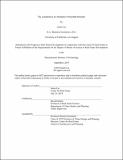| dc.contributor.advisor | David Geltner. | en_US |
| dc.contributor.author | Lai, Justin(Justin C.) | en_US |
| dc.contributor.other | Massachusetts Institute of Technology. Center for Real Estate. Program in Real Estate Development. | en_US |
| dc.date.accessioned | 2020-01-23T16:59:54Z | |
| dc.date.available | 2020-01-23T16:59:54Z | |
| dc.date.copyright | 2019 | en_US |
| dc.date.issued | 2019 | en_US |
| dc.identifier.uri | https://hdl.handle.net/1721.1/123609 | en_US |
| dc.description | This electronic version was submitted by the student author. The certified thesis is available in the Institute Archives and Special Collections. | en_US |
| dc.description | Thesis: S.M. in Real Estate Development, Massachusetts Institute of Technology, Program in Real Estate Development in conjunction with the Center for Real Estate, 2019 | en_US |
| dc.description | Cataloged from PDF version of thesis. | en_US |
| dc.description | Includes bibliographical references (page 36). | en_US |
| dc.description.abstract | Leaseholds play roles in many different types of transactions -- from single-family home purchases to multi-tenant office tower developments. Despite their flexibility, however, leaseholds are rare in the US and are not widely understood by investors and developers. Compared with freeholds, leaseholds involve additional layers of complexity and can present valuation challenges. If not structured thoughtfully, they can substantially erode the value of the real estate by lowering its quality and usability. Nevertheless, leaseholds can be useful devices to facilitate real estate investment and significantly impact communities by bringing together parties that would not have otherwise worked together. This thesis focuses on leaseholds in the US: how they are valued, how they are structured, and what issues they pose. It analyzes the motivations behind each party involved in a leasehold and finds that they can benefit from acting more like joint venture partners rather than opposing counterparts, specifically concerning issues related to leasehold improvement financing and the redevelopment option. | en_US |
| dc.description.statementofresponsibility | by Justin Lai. | en_US |
| dc.format.extent | 37 pages | en_US |
| dc.language.iso | eng | en_US |
| dc.publisher | Massachusetts Institute of Technology | en_US |
| dc.rights | MIT theses are protected by copyright. They may be viewed, downloaded, or printed from this source but further reproduction or distribution in any format is prohibited without written permission. | en_US |
| dc.rights.uri | http://dspace.mit.edu/handle/1721.1/7582 | en_US |
| dc.subject | Center for Real Estate. Program in Real Estate Development. | en_US |
| dc.title | The leasehold as an alternative ownership structure | en_US |
| dc.type | Thesis | en_US |
| dc.description.degree | S.M. in Real Estate Development | en_US |
| dc.contributor.department | Massachusetts Institute of Technology. Center for Real Estate. Program in Real Estate Development | en_US |
| dc.contributor.department | Massachusetts Institute of Technology. Center for Real Estate | |
| dc.identifier.oclc | 1135867938 | en_US |
| dc.description.collection | S.M.inRealEstateDevelopment Massachusetts Institute of Technology, Program in Real Estate Development in conjunction with the Center for Real Estate | en_US |
| dspace.imported | 2020-03-09T19:59:31Z | en_US |
